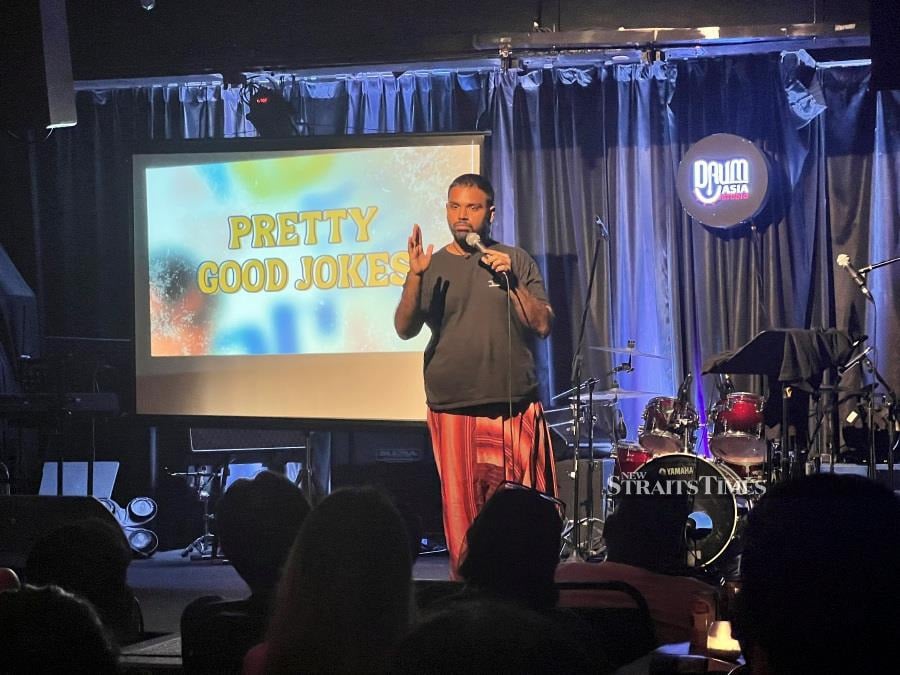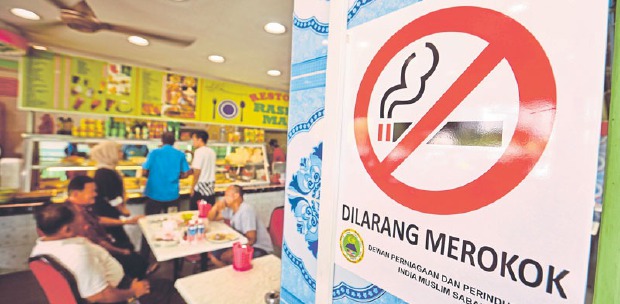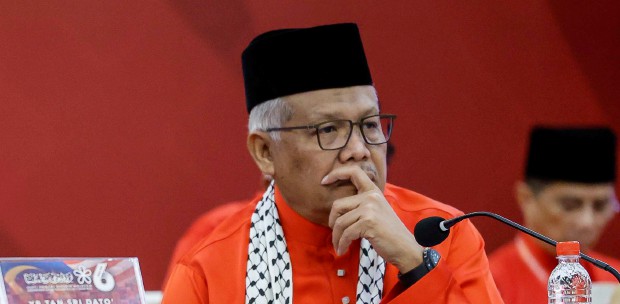HEAVEN knew I could use a laugh. The weather wasn't exactly helping.
Heavy downpour, the incessant honking, lorries hurtling past my little car while belching black smoke — these weren't lightening my mood at all. "This better be worth it," I muttered to myself as I wove my car through the gridlock that inevitably happens every time it rains. Ah, rush hour. Not exactly an ideal time to venture out for a comedy show that may or may not make me laugh.
"Is it going to be funny?" I remember asking stand-up comic Harresh Asohan or better known by his moniker, Harresh AU. It was a silly question of course, but he didn't admonish me. Instead, he stared at me wordlessly for a while. "I'll try," he finally replied.
The rain and traffic be damned. I made it to the show with another friend of mine, who I might add, wasn't too fond of stand-up comedy. "Have no expectations," I told her, as a sort of friendly prewarning just in case our excursion turned out to be a bust.
You could never tell with shows like these. I mean, one man's joke could be another man's well… groan. We obviously weren't what the show needed — two po-faced women preparing to be disappointed. I could've sworn Harresh's face grew a tad more mournful when he caught sight of me.
The Line Up Malaysia — a collective of sorts — has been showcasing and promoting stand-up comedy for about two years and this show happened to be the 13th episode. Perhaps the number 13 should've been a harbinger for Harresh and company. After all, I hauled my judgmental self along with humour-deprived friend up four flights of stairs for his show. That showed some commitment, I'd like to think.
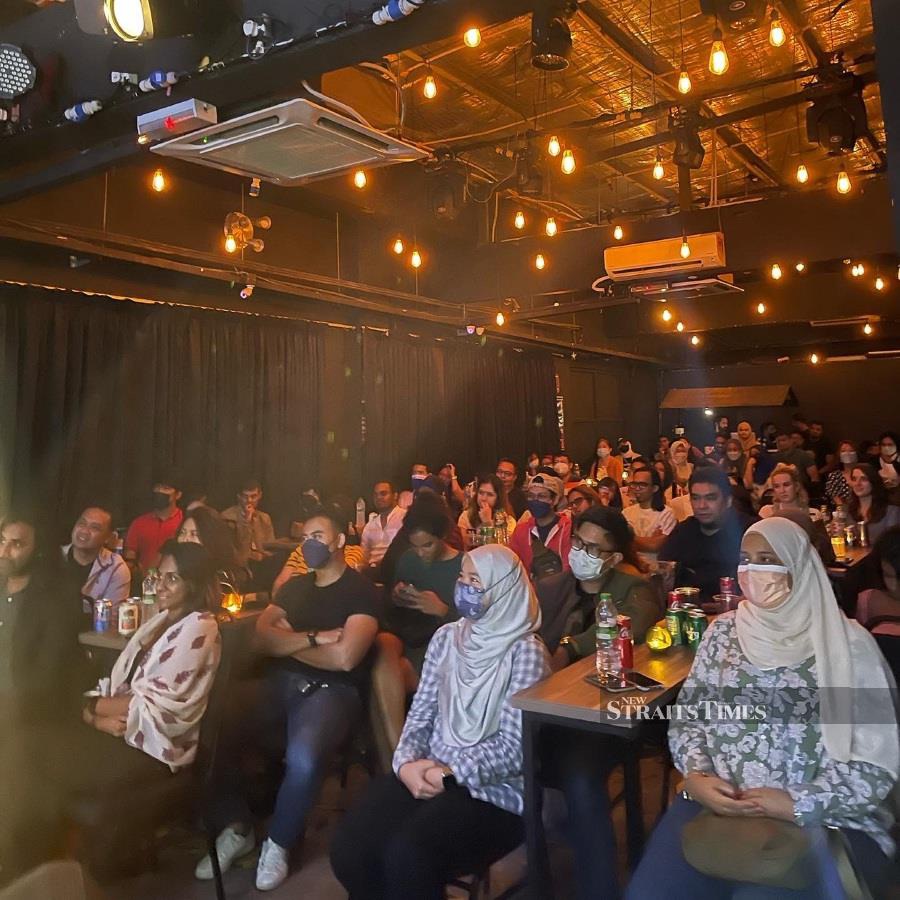
And the show began. An affable host and a couple of openers to work up the crowd, set the ball rolling.
Hey, where you from? What do you do?
Are these really the building blocks of an emerging art form?
Crowd work, the comic's chatter with the audience in between jokes, has long been derided as the cheapest way to get laughs. But lately it's been receiving more attention and respect from performers who have moved it from a supplementary part of their act to the main event.
Do they get the laughs? Of course, they do. The darkened hall was packed with people who were easy to please. Case in point: there was a guy behind us who laughed throughout. He clearly didn't need a punchline to set him off.
And then there was Harresh himself, who walked us through his series of old, somewhat old, relatively recent and brand-new material. Ah, the old jokes aren't always funny, he conceded half-mournfully with a shrug of his shoulders. His approach was subtler than the rest and his jokes were laced with self-mockery.
On the spectrum from freewheeling to more structured, he fell in the middle, letting audiences tell their stories, then riffing until he found the perfect punch line. Swagger alternated with self-deprecation. "Oh, this joke is terrible. Next!" he talked to himself onstage and the audience tittered half-sympathetically.
He was fun to look at and listen to. But you couldn't do it for long without worrying a little. That morose face? It never changed. He had a peculiar gift of stand-up. It made you want to root for him and laugh at all his jokes even if they flew wide off the mark.
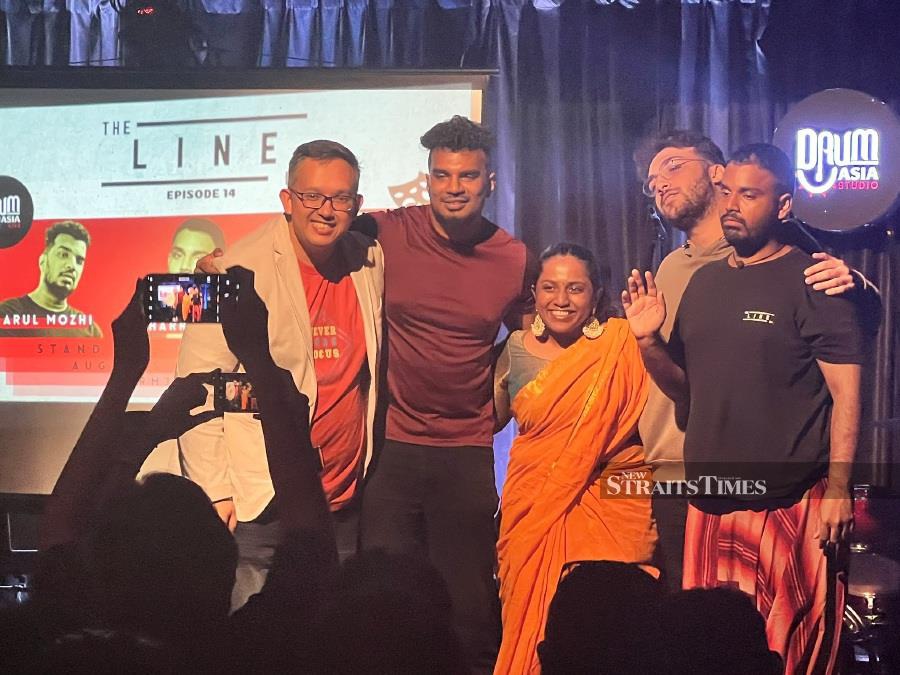
I was right, of course. And pleasantly wrong. There were laugh-out-loud moments and gasps interspersed throughout the show. The jokes kept coming. There were some hiccups in between and groan-out-loud attempts but, by George, this group of young comics had worked hard to bring on the laughter.
Not everything was funny but everything got a reaction. Whether it was gasps of disbelief, the "I-can't-believe-you-just-said-that" jokes, or the belly-aching laughter when the jokes actually did hit the mark.
So, it wasn't a complete bust after all. In fact, it was downright entertaining.
GETTING A LAUGH
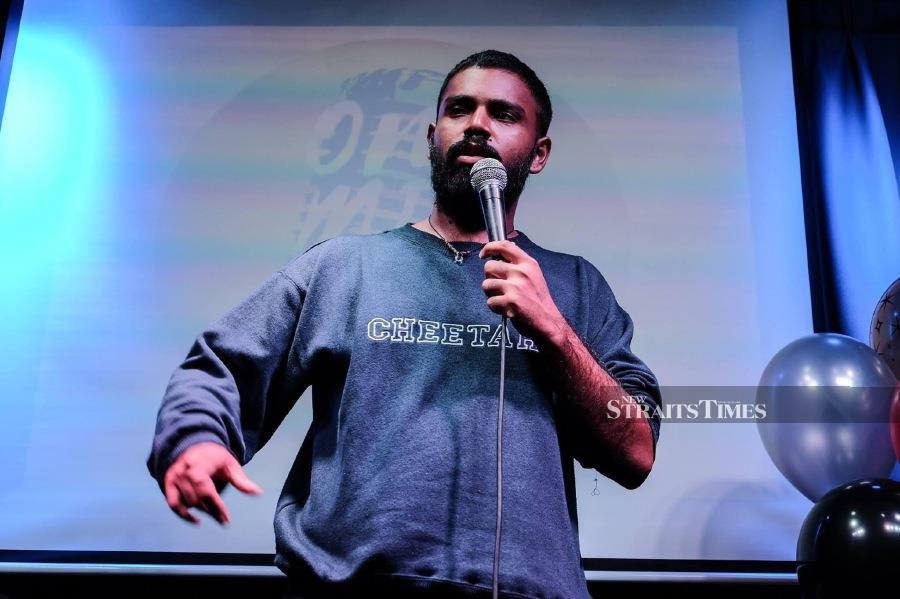
He seems completely unfazed when I share my thoughts about the show. "I couldn't find an attachment to my older material," he confesses, with a deprecating shrug. The cafe is noisy and I strain my ears to hear what he has to say.
A couple of days has passed since "Episode 13" of the Line Up was showcased. He looks mournfully at me, before adding: "Those jokes were done a long time ago and I was so different back then. Trust me, I didn't like repeating those jokes again."
I shake my head sympathetically. "That sounds so sad. I mean, you not liking your own jokes." He nurses his coffee and then looks up at me. "It's bound to happen. People evolve all the time. But there were jokes I did enjoy and the audience could sense that rhythm when that happened."
Looking a little rumpled for wear, the 30-year-old sits there looking as dour and mournful as he did onstage not too many days ago. "Are you always as sad as you look?" I blurt out curiously. A rare smile flits through briefly before he settles to looking mournful again. "This is who I am," he insists, shrugging his shoulders before lapsing into silence.
"Well, it was an entertaining show," I tell him again, half reassuringly. "Thank you. I appreciate that," he replies simply. "There were some misses. Not all the comics featured were funny," I add severely.
He leans forward and points out: "But you had a reaction to the jokes, didn't you?" Well, I wasn't laughing all the time, I retort. Some jokes were just groan-worthy. "But you groaned. Then we did something right. Sometimes that's all we want!" he responds blithely.
You can't play it safe when you're doing stand-up comedy, he continues, adding: "You have to risk looking like a douchebag on stage… like a real fool. You've got to make an idiot of yourself sometimes!"
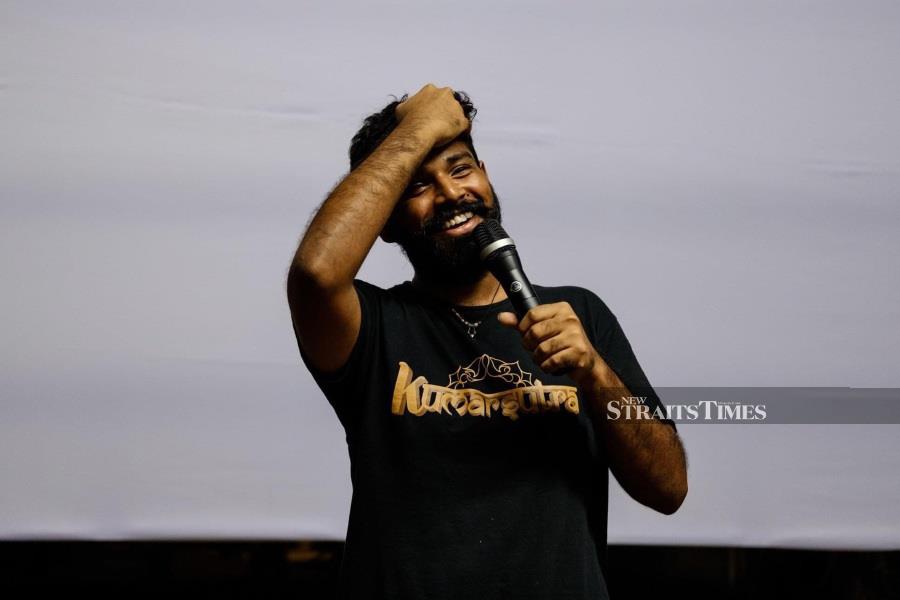
Stand-up comedy might look easy, but professionals know it's anything but that. Starting out, stand-up can be miserable, humiliating and fruitless. No wonder it's alleged that comedians are the saddest people in the world. "I'm a sad guy!" he agrees, another rare smile flits through briefly.
A brief pause, and he muses: "The whole thing about comedy is to fail as much as you can, to find out where your strengths are. Don't pander to the crowd. Be exactly who you are. For me, I try to be as authentic onstage and offstage. I struggle with that and sometimes I do cross the line. But the only way to know if you've crossed the line is by crossing the line!"
Wise words indeed coming from one who's been in the business for about eight years. Harresh insists he's still a work in progress. "I'm constantly in a state of flux. You've got to keep on working on your material. It takes constant practise to develop a sense of style and rhythm that works," he shares, sighing mournfully.
Does he think he's a funny guy? He shakes his head vehemently. "Oh, I'm not!" he replies quickly. His aim is to get a reaction. It doesn't necessarily have to be laughter. Any reaction is a good thing, he insists again. "Like my groans?" I tease him and he laughs, nodding.
Isn't the measure of success for stand-up comedy, laughter? He shakes his head again. Comedy, he explains, is subjective. Different jokes appeal to different people and it's close to impossible to accurately identify with all of them.
It takes a lot of courage to stand up in front of people and be spontaneous about being funny. It's like testing the depth of a sea with both legs. Chances of drowning are high if your swimming strokes can't fight the tide.
"There was a time I was shown the reaction of the audience to my jokes at a show. They were gasping and looking at each other with disbelief. That was immensely satisfying!" he recalls before adding: "I don't just want people to laugh. I want them to gasp with shock, shake their heads in disbelief, or groan out loud. I want to see these reactions and I want to understand why they react that way. It keeps me wanting to do stand-up comedy all the time!"
He thinks about comedy every single day. "I live and breathe it," he confesses, revealing that he had trouble sleeping last night because he was busy planning and thinking of the sketches he wanted to perform for the next episode of The Line Up.
EARLY BEGINNINGS
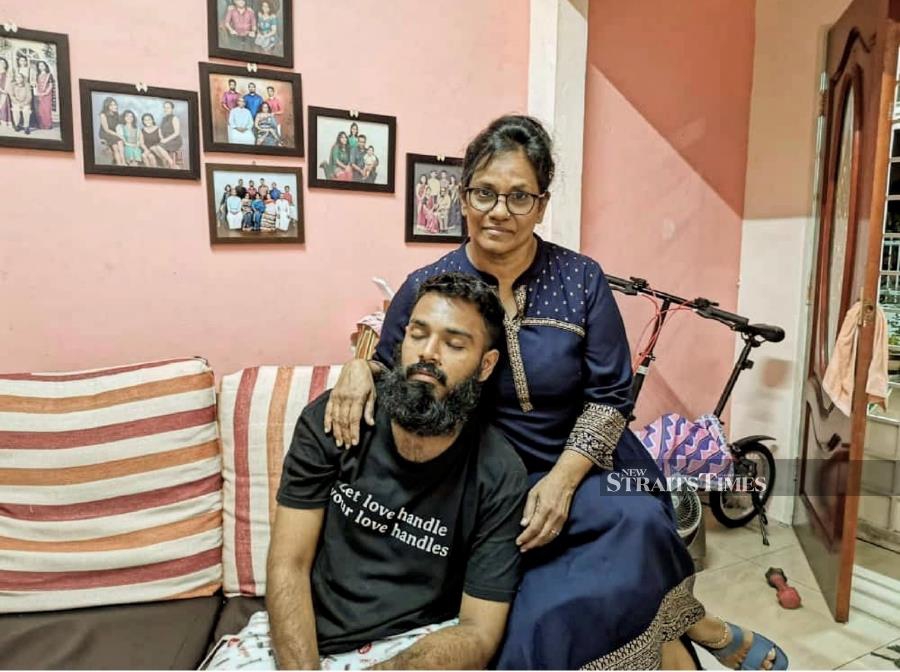
He loves comedy, he confides. It makes him happy. It's hard to see what really makes him happy. I mean, his tone sounds like he really means it but his dour face with mournful eyes is telling me something different — like he probably needs to have a good cry or undergo grief counselling. Or maybe both. Maybe there's something about his early days that lends credence to his sad, stoic countenance.
The Klang-born is candid about his growing up years. Mum is a pre-school teacher and dad? "I don't know what he does," he mumbles. Divorced? Oh no, he shakes his head, adding: "Dad's around. But we don't talk very much." Ah, daddy issues. That's one source for his angst, I think to myself. Are you the eldest? I ask again. He pauses for a beat, before replying: "I had an older brother." Had? "He died."
Wait. Is there a punchline somewhere that I'm missing? He shakes his head explaining: "No, really. He passed away from cancer when he was 10." And now I feel bad.
It must have been hard, I say sympathetically. "Well, my family has a history of cancer," he says mildly, before continuing: "My grandmother had breast cancer, my brother had leukaemia… and I have cancer jokes." Kapow! I stare at him aghast. "I make cancer jokes all the time," he adds, shrugging his shoulder. I can't help myself. I laugh.
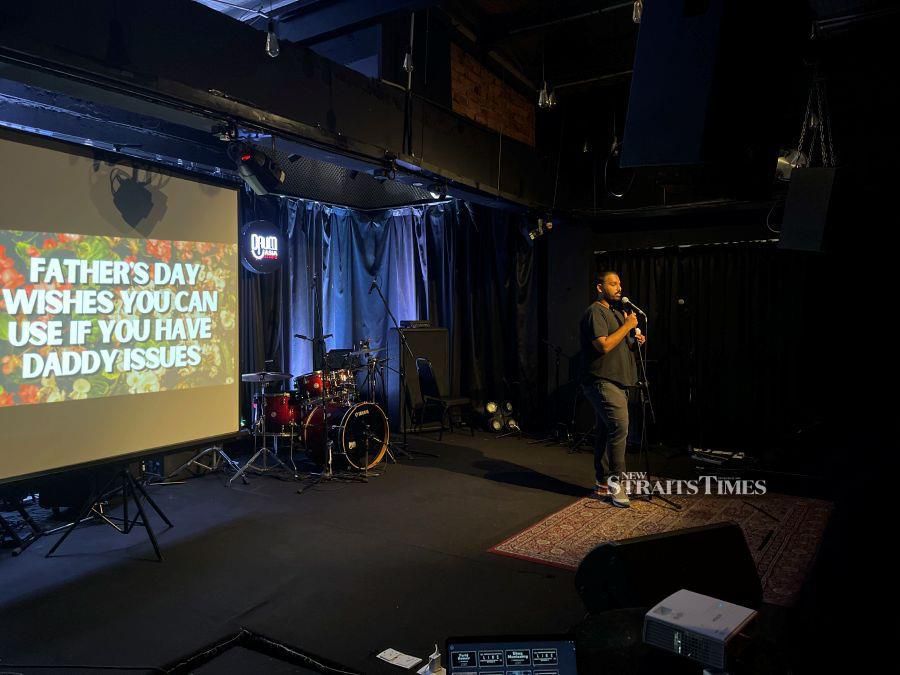
It was hard grappling with the loss of his older brother, he concedes. When his brother died, he isolated himself from his two younger brothers. Recalls Harresh: "I rarely saw my father communicate with his brothers while I was growing up. This cycle repeated itself when my older brother passed away."
Adding, he reveals: "His death was hard to deal with because we were very close. It's only now that I'm actually making an effort to reconnect with my younger brothers. I knew I had to break that cycle."
Do you talk to your mum at least? His face brightens up immediately. "Oh, my mum and I are best friends. I call her 'babe' actually!"
He's not the best in communicating his feelings, he admits. "I tend to mask my feelings and bury them deep within." Jokes harnessed his penchant for extreme candour and helped him cope with long-unresolved feelings. "I remember crying at the train station after my first break-up. Then I told myself I was going to be funnier!" he shares quietly.
There was yet another influence that somehow had a lasting impact. His father used to watch the sitcom Seinfeld a lot when Harresh was much younger. For most of the series, Seinfeld's episodes started and ended with Jerry Seinfeld's stand-up routines, which were used to connect to the actor's real-life comedy roots while also providing bits that connect to the issues faced by the main characters in each episode. "As a kid, I found his stand-up routine so fascinating. He seemed to have a lot of power up there on stage. And I wanted that power!" he recalls.
Did that influence him to want to do stand-up as a living? He shakes his head. Not at that point. He wanted to be an astronaut, a scientist, a paediatrician and then, he wanted to play football.
LONG ROAD TO COMEDY
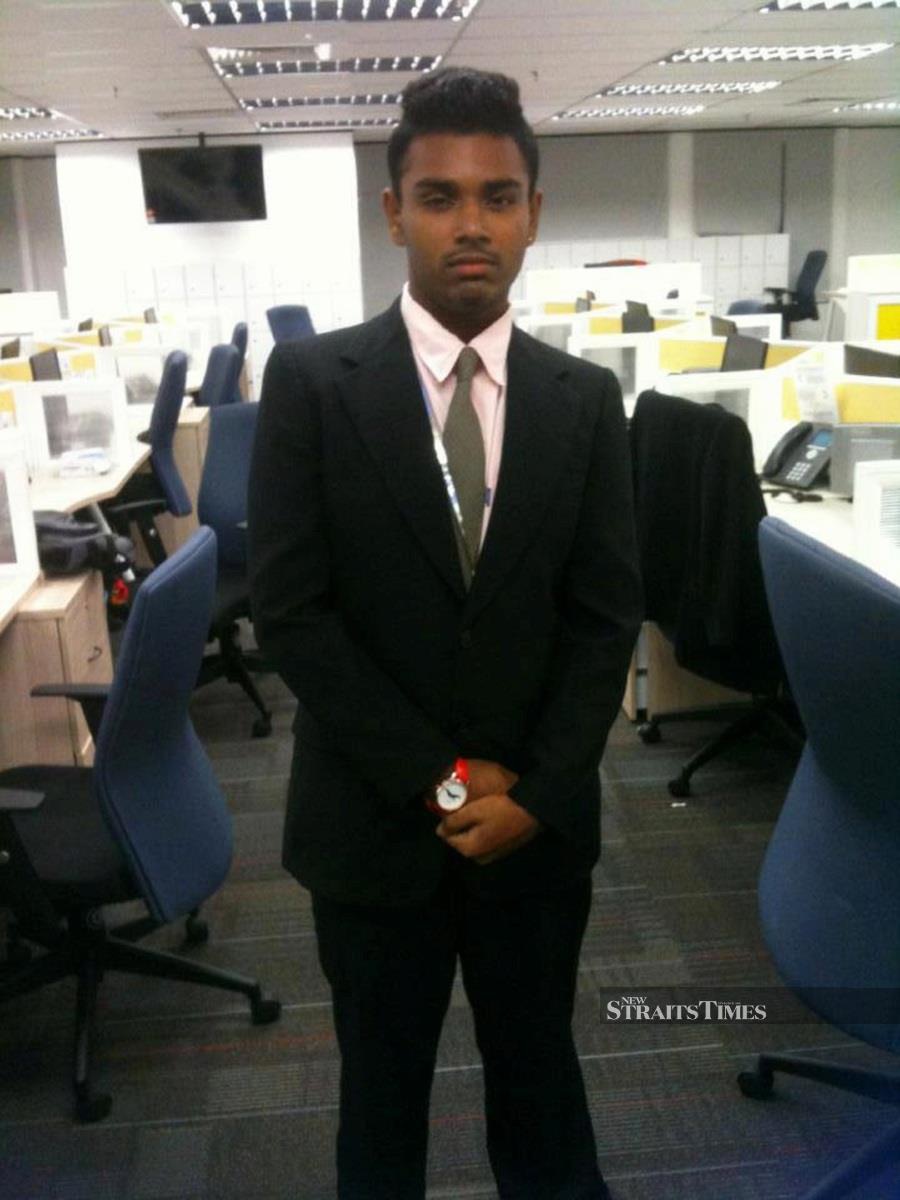
After Form Five, Harresh begged his father to enrol him for a diploma in football studies, instead of biotechnology which he'd initially planned to pursue. He was good in science but after stumbling upon the advertisement for football studies, he changed his mind. "I liked playing football so why not?" he mused. I've never heard of football studies, I say dubiously. "It was more into coaching," he explains.
After completing his diploma, Harresh went on to complete his Bachelor of Business (Sports Management) where he achieved a respectable second-class honours degree. With a coaching licence, Harresh then spent his time coaching children in football for free.
"Yes, for free!" he reiterates dryly. He'd applied at every football academy in the Klang Valley but to no avail. "They wanted someone with playing experience," he explains, adding: "I only had theoretical knowledge which wasn't what most coaching academies were looking for."
It must have been frustrating, I say and he nods. "I won't lie, I felt lost for a while," he admits. He went through a series of short-lived jobs before eventually settling for the post of a librarian at a private school.
Did he enjoy it? "Well, I loved the kids and the teachers. They found me funny. One of the teachers suggested I do stand-up comedy. I remembered Seinfeld and then Googled what stand-up meant. I discovered Crackhouse Comedy," he recounts.
Something clicked within him. One of the longest-running dedicated stand-up comedy club, Crackhouse provided a platform for newbies like Harresh to hone his skills. "I figured I was funny enough to try out the open mic shows. But it took me eight months before I got my first laugh. I tanked badly for eight whole months!" he admits, chuckling.
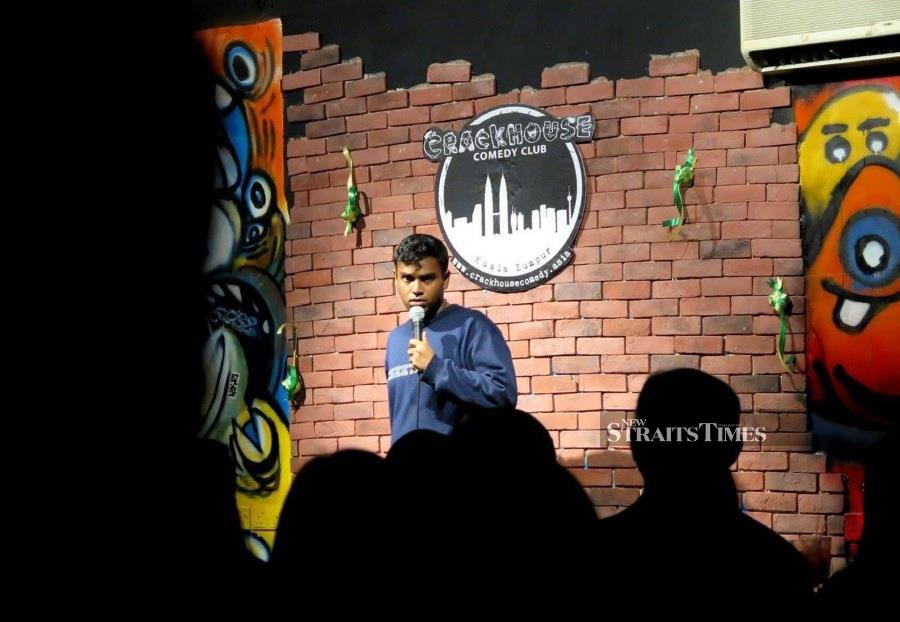
Unsurprisingly, Harresh got hooked on comedy. "I grew so obsessed in trying to get a reaction from the audience. It affected my job at the private school because I started writing my jokes at work. After two years, I resigned and joined Crackhouse Comedy as a staff while I kept working on my material at the open mic shows there," he says.
When he finally got his laughs, he knew he was on to something. "It's the voice," he explains candidly. "With a face like this…" he points to his bearded face, before continuing: "You won't expect a voice like this. I think I sound like a girl!"
A girl? No, you don't! He tells me that one of his short-lived jobs included a brief stint at a call centre ("I lasted only for a month" he tells me blithely). There were times when callers mistook him for a woman and called him "madam". He raises his hands in protest at my look of disbelief. "It's true!" he insists.
After two years, Harresh left Crackhouse Comedy Club and worked at an event space for a while. Again, he began feeling lost. "I wasn't going anywhere. I was doing gigs here and there, so I was feeling a little aimless," he shares quietly.
He eventually moved on to another comedy club that opened up. However, that was also short-lived. "I felt depressed. I was doing everything else but performing. That made me really unhappy," he admits, shamefacedly.
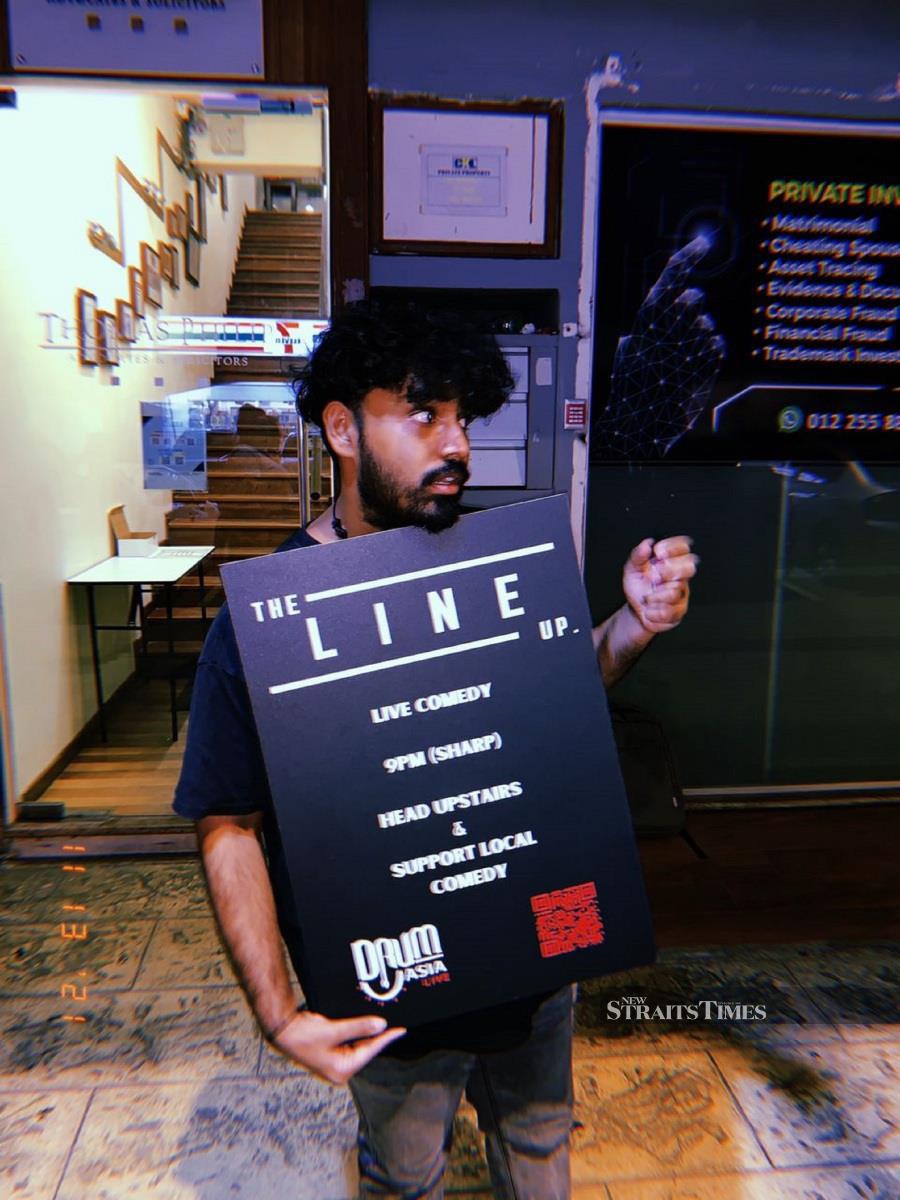
In 2019, Harresh and three of his comedian friends formed The Line Up Malaysia. He wanted to perform and the only way he could do that was to create his own platform. Explains Harresh: "If you perform at open mics, the most they'd give you is five minutes. As a growing comic, I need more time on stage to hone my skills. I needed 10, 15 and even 20 minutes to practise my jokes and try out new material."
But having comedians as partners wasn't exactly a great idea. "I ended up organising everything, from finding the venue to marketing the shows. This wasn't good for me because I'd be burnt out before I even took the stage," he shares. After the sixth show, Harresh and his band of comedians that made up The Line Up parted ways.
The determined comic continued with The Line Up by himself and fashioned the show as an open-mic concept instead of a variety show. It was held at an event space in Petaling Jaya with just one speaker and one microphone.
He recalls seeing the audience walk in while they were still in the midst of setting up. The show had to go on whether they were ready or not, so he braced himself and started talking to the crowd.
"It registered to me at that moment that I'm no performer. I'm just a regular guy. Just Harresh," he says quietly, adding: "I didn't have a format. There was no host, no hype, no popping music. I walked in to a cold crowd and tried to make them laugh. It was more challenging, more difficult, more painful. But I'd been stagnant for two whole years, so I had to take that step. I soon realised that this was the tone I was going for."
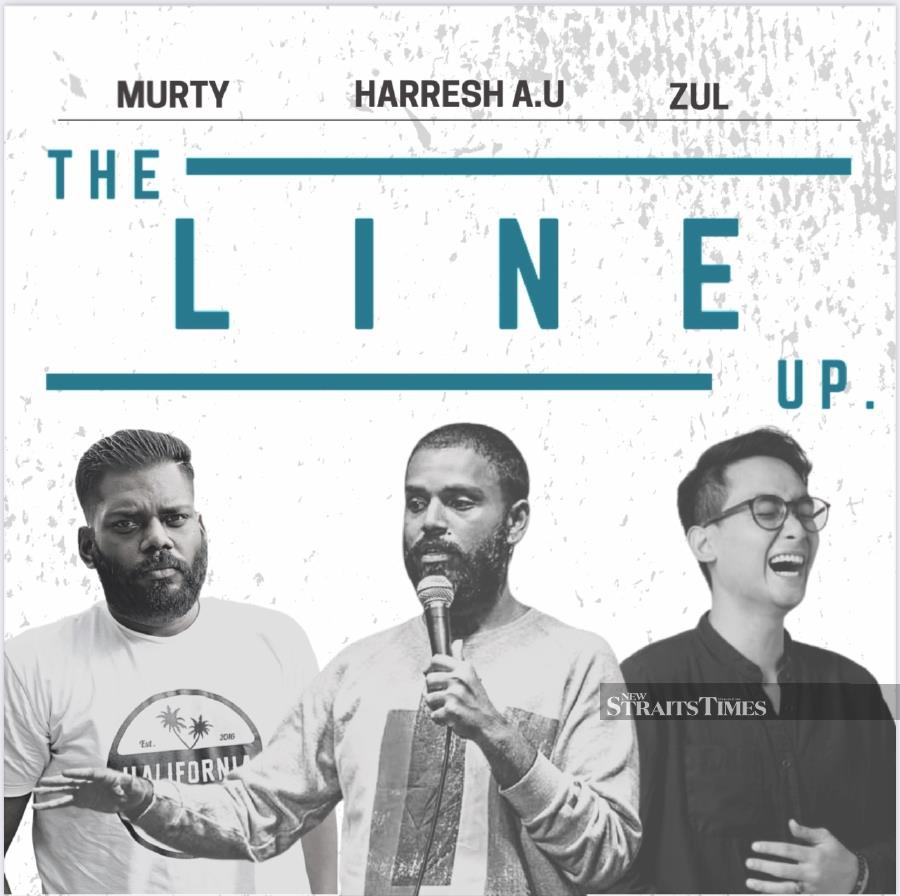
He eventually found like-minded friends who were willing to run The Line Up with him. "Thankfully they weren't comedians themselves. That makes a lot of difference because they could help lessen the load while I focused on performing," he says.
There's no looking back since.
"I'll probably be doing this until the day I die," he declares, before lapsing into silence again. He looks at me mournfully, maintaining a stoic deadpan before continuing: "I want to do all forms of comedy, like sketches, movies, parodies, songs… you know… anything funny!"
And I can't help but root for him.
THE LINE UP: EPISODE 14
WHERE: Drum Circle Asia
WHEN: Aug 26 and 27
For ticket enquiries, check www.instagram.com/thelineupmy.


